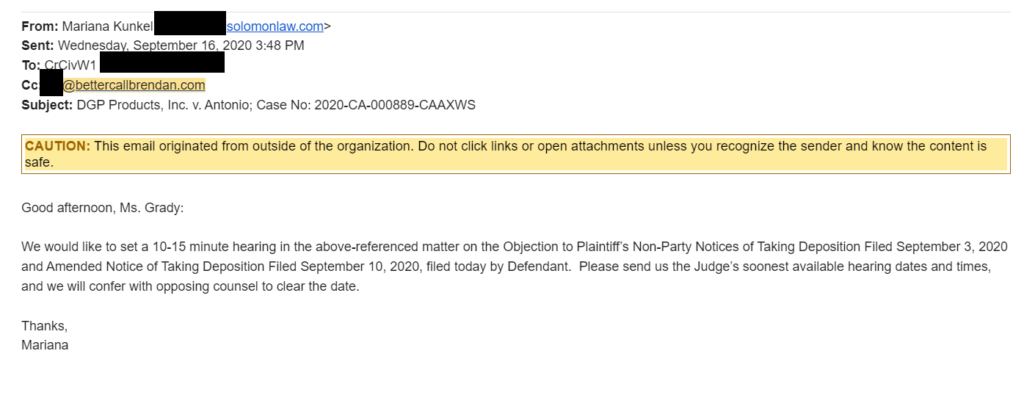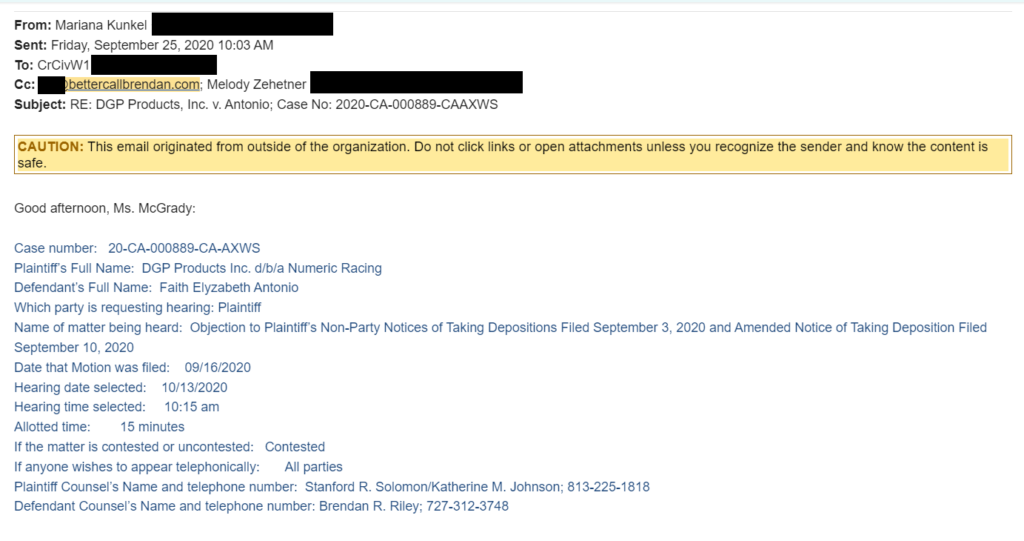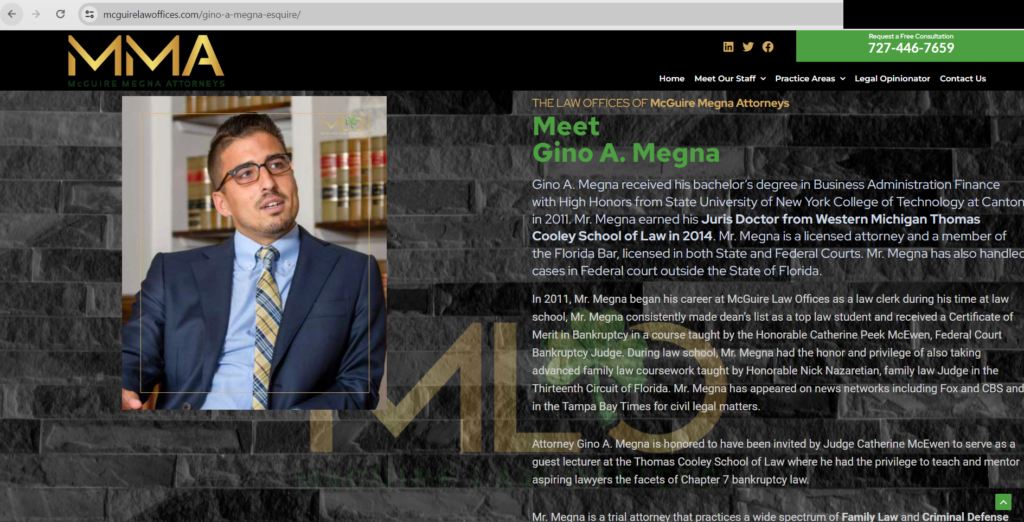
Pasco County State Court
Judge Byrd directs her Order to Provide Status Update to “Counsel for Plaintiff” not to the Defendant who is the party in Bankruptcy. In her Order, Judge Byrd directs PLAINTIFF to submit a written submission on the status of the case, waiting almost 2 years later, to indicate if the STAY IN BANKRUPTCY IS LIFTED. DGP PRODUCTS SHOULD NOT BE IN MY BANKRUPTCY. THE ONLY PARTY SUITED TO RESPOND WAS THE DEFENDANT. The intentional delay where JUDGE MCEWEN refused my discharge for two years with an absent TRUSTEE was designed to push me to walk away because the LAW WAS BEING VIOLATED.

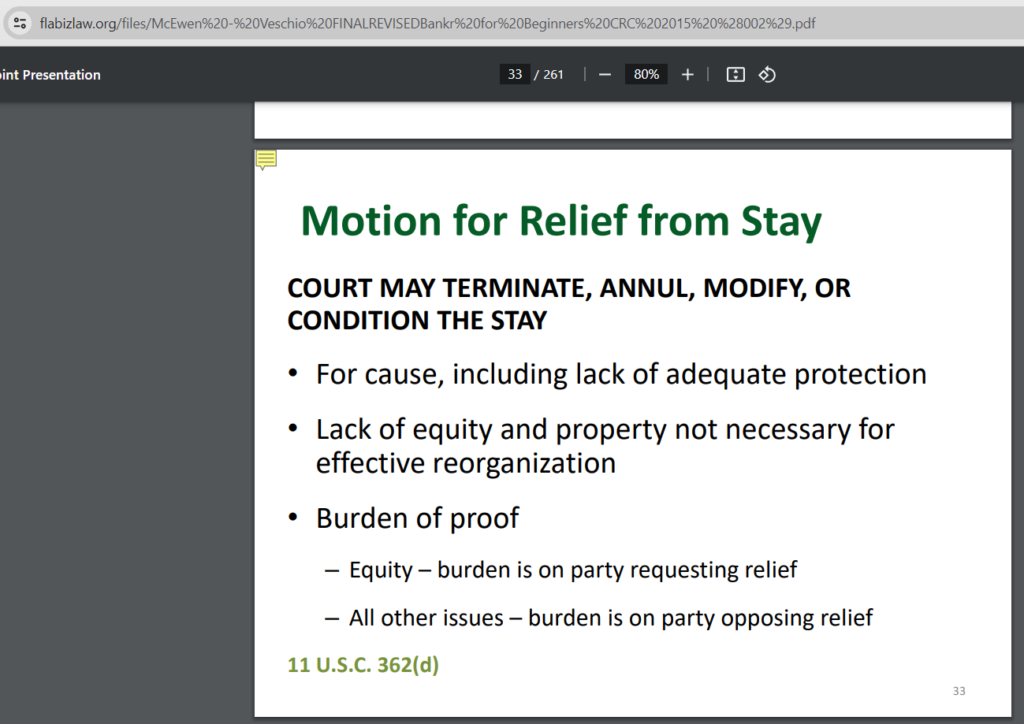
No Motion for Relief from Stay was Filed In This Case
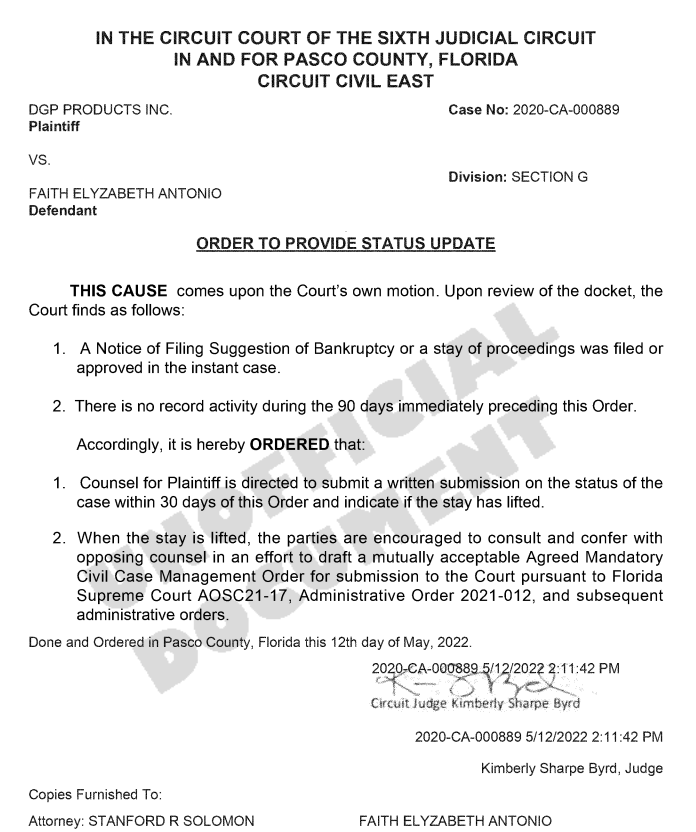
After filing the Motion to Dismiss, attorney Brendan Riley proceeded to deflect away from the Motion and his duty to set the motion for hearing. DGP/Geberth’s attorney NEVER filed a Response to the Motion to Dismiss and the Judge never appeared to determine if she had jurisdiction.
Attorney Riley continued the financial and psychological harm he had written in the Motion to Dismiss and his actions pushing for discovery with full disregard of the domestic violence and restraining order.

The large cash withdrawals from DGP’s Synovus Bank Account gives reason that these legal professionals were accepting bribes.

“The primary purpose of a motion to dismiss is to request the trial court to determine whether the complaint properly states a cause of action upon which relief can be granted and, if it does not, to enter an order of dismissal. Provence v. Palm Beach Taverns, Inc., 676 So.2d 1022 (Fla. 4th DCA 1996). In making this determination, the trial court must confine its review to the four corners of the complaint, draw all inferences in favor of the pleader, and accept as true all well-pleaded allegations. City of Gainesville v. State, Dept. of Transp., 778 So.2d 519 (Fla. 1st”
(By Ms. McHugh) So we have seen that you sent Ms. Antonio a 1099 from your company?
GEBERTH: Yes.
Q: Do you have a vendor contract?
GEBERTH: I — I don’t know what a vendor contract is. == I don’t have an em — I’ve never had an employment contract with anyone. I don’t know — I don’t know what an employment contract is.
Q: Well, are they paychecks?
GEBERTH: Yes, they are paychecks.
Q And did you report those to the IRS?
GEBERTH: She was doing my accounting.
Q Okay. Did you report them?
GEBERTH: I reported them to the IRS.
Q What supporting documents do you have — to justify sending her a 1099?
GEBERTH: I have — in my computer I have the complete audit history.
MR. BERNSTEIN: Your Honor —
GEBERTH/DGP HAS AN ACCOUNTANT --->
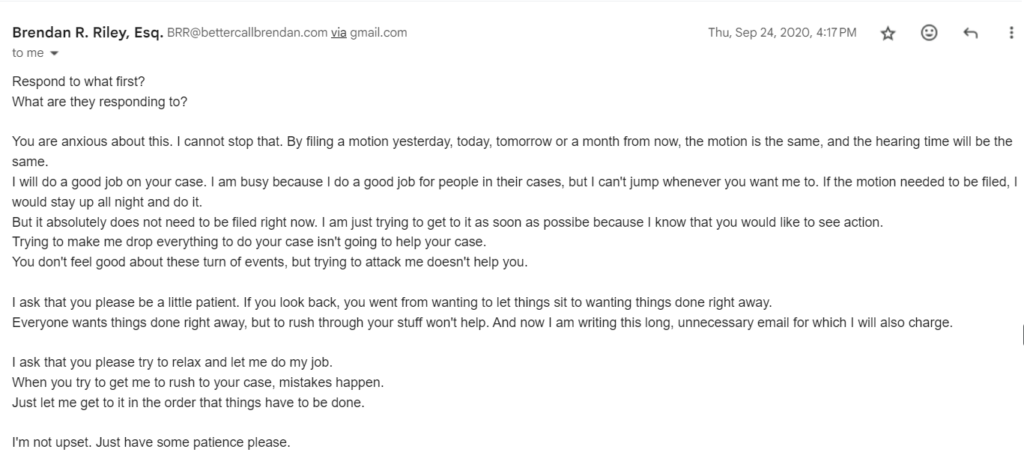


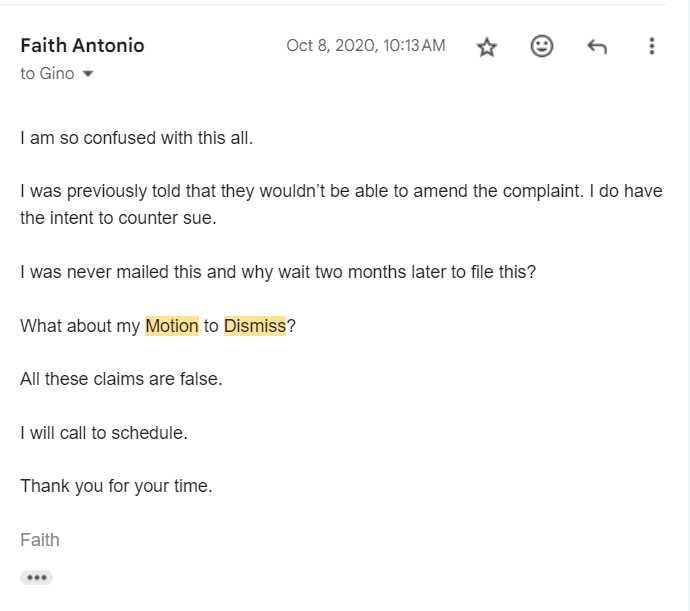
A party may amend a pleading once as a matter of course at any time before a responsive pleading is served or, if the pleading is one to which no responsive pleading is permitted and the action has not been placed on the trial calendar, may so amend it at any time within 20 days after it is served. Otherwise a party may amend a pleading only by leave of court or by written consent of the adverse party. If a party files a motion to amend a pleading, the party shall attach the proposed amended pleading to the motion. Leave of court shall be given freely when justice so requires. A party shall plead in response to an amended pleading within 10 days after service of the amended pleading unless the court otherwise orders.
Rule 1.190 – AMENDED AND SUPPLEMENTAL PLEADINGS, Fla. R. Civ. P. 1.190
“As of August 2020, DGP has been able to uncover $159,004.96 that was stolen, embezzled or misappropriated by Antonio during her employment at DGP. Antonio’s theft has required DGP to amend and refile its federal income tax returns for all the years in which Antonio worked for DGP.”
“On August 13, 2020, DGP sent to Antonio an updated civil theft demand letter demanding repayment of this amount, in accordance with and pursuant to section 772.11, Florida Statutes. A copy of the civil theft demand letter is attached as Exhibit “G”. Antonio has not responded to the civil theft demand letter.”
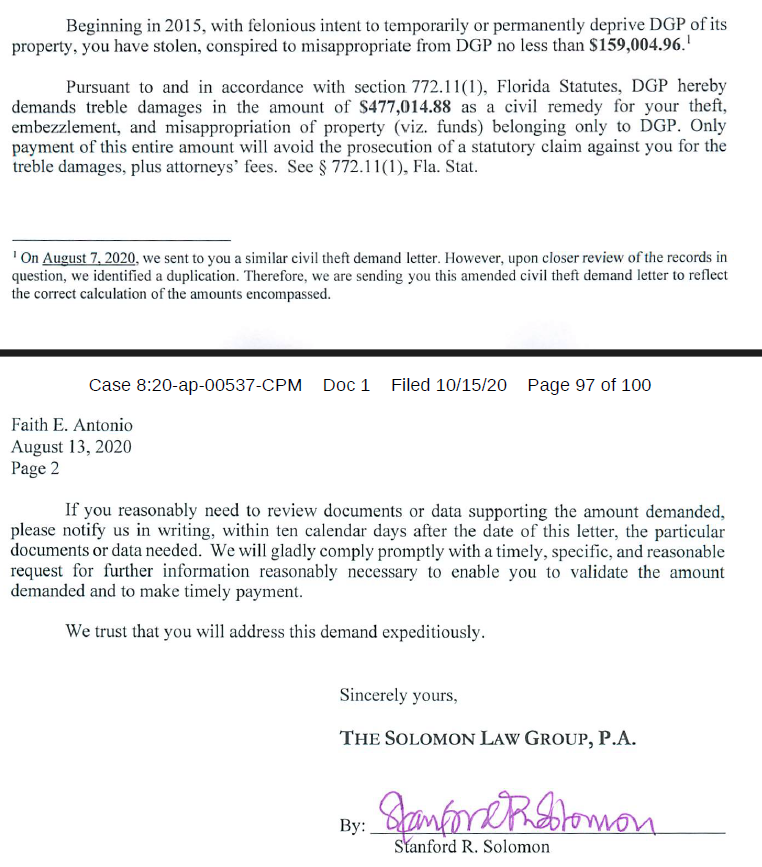
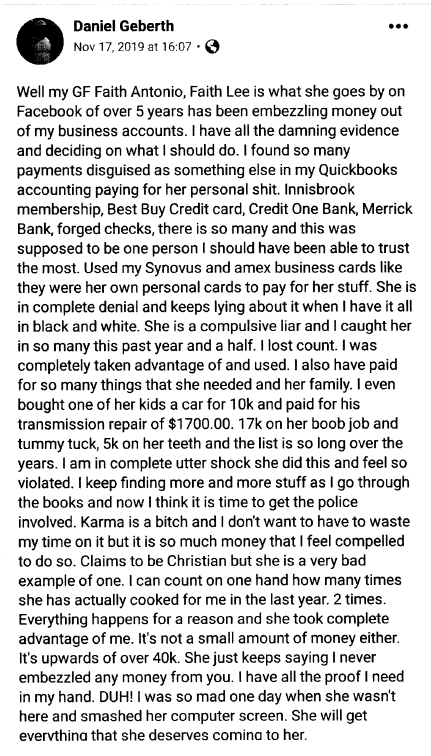
In 2019, the United States Court of Appeals for the Eleventh Circuit clarified the meaning of the phrase “related to” in 28 U.S.C. §1334(b), the federal statute that governs the subject matter jurisdiction of bankruptcy courts. A bankruptcy court exercises jurisdiction derivative of and dependent upon a district court’s jurisdiction.
THOMPSON: Your Honor, also on the docket is a Motion to Enforce the Stay, filed by Ms. Antonio.
MCEWEN: Page 9. Oh, I see. It’s at the bottom. Okay. The stay is in effect. We are litigating the adversary proceeding here. That does not violate the automatic stay. So, what is it that you thinks violates the automatic stay?
ANTONIO: Well, this is not a core proceeding.
MCEWEN: Yes, it is. It’s as core as core can get.
ANTONIO: How is it a core proceeding?
MCEWEN: Section 523 does not exist outside of a bankruptcy. The discharge –
ANTONIO: This case is litigating… this case mimics, to a “t”, the amended complaint on State Court claims.
MCEWEN: Only a bankruptcy judge has jurisdiction to determine if there is a 523(a)(2), (4), or (6) in play. It’s as core as core can get. Have you looked at Rule 7001? – Rule 7001, subsection (6), it’s as core as core can get, ma’am. Only a bankruptcy judge can be doing this. It’s core.
ANTONIO: So if the State Court action is not litigating a dischargeable claim, so how is it happening when this is State Court claims of Conversion, unjust enrichment? — I am not waiving my jury trial, so how is it litigating here?
MCEWEN: This is not anything that is jury triable. It’s an exception to the discharge.
ANTONIO: First the State Court claim should come to judgment before it comes to this court — There is a stay violation here. — in my MOTION ITS ALL WRITTEN OUT.
MCEWEN: It’s Document 61. What part of section 362(a) do you think is being violated?
MCEWEN: I can’t make them leave you alone, ma’am. I can give you trial time so that you can win, attempt to win.
MCEWEN: All right. Well, I find that there is no violation of the automatic stay. The adversary proceeding is a core proceeding. It’s as core as core can get. The Bankruptcy Court has jurisdiction under Title 28, Section 157 to conduct this proceeding. The fact that it may overlap allegations that are lodged in the State Court Complaint does not make it non-core. Indeed, frequently the core set of facts that underlies a State Court suit would be the same in a dischargeability proceeding, and so I deny her motion.
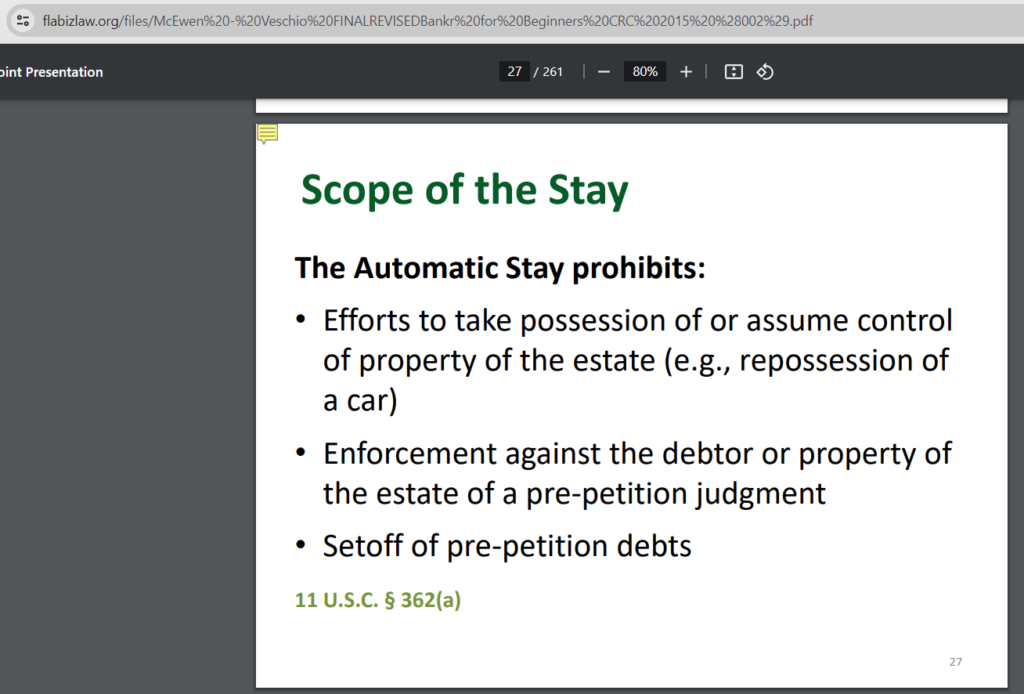
On May 28, 2021, Judge Catherine Peek McEwen entered her Order “Clarifying Commencement of Case and Effect of Automatic Stay in re Bitman, Case No. 8:21-bk-00206-CPM
The time the Debtor filed his bankruptcy petition is key because a voluntary bankruptcy case is “commenced by the filing ” of a petition with the bankruptcy court, and the commencement of a case creates a bankruptcy estate consisting of, among other things, “all legal or equitable interests of the debtor in property as of the commencement of the case,” with certain exceptions not applicable here. Thus, all such legal or equitable interests become property of the bankruptcy estate upon the filing of a petition. And under § 362 of the Bankruptcy Code, actions against a debtor or property of the estate become subject to the automatic stay when a petition “is filed. ” This stay arises to protect against:
(1) the commencement or continuation, including the issuance or employment of process, of a judicial, administrative, or other action or proceeding against the debtor that was or could have been commenced before the commencement of the case under this title, or to recover a claim against the debtor that arose before the commencement of the case under this title;
(3) any act to obtain possession of property of the estate or of property from the estate or to exercise control over property of the estate;
“Under controlling Eleventh Circuit precedent, all actions taken in violation of the stay are “void and without effect.”
Judge Kimberly Sharpe Byrd Remained Silent Upon Notice of Violations

Florida Rules of Judicial Administration 2.215(f): Every judge has a duty to rule upon and announce an order or judgment on every matter submitted to that judge within a reasonable time. Each judge shall maintain a log of cases under advisement and inform the chief judge of the circuit at the end of each calendar month of each case that has been held under advisement for more than 60 days.
April 17, 2023

This article from the Florida Bar addresses proposed rule amendments, including by state lawmakers, who said the committee was overstepping its bounds and giving chief judges too much say in court clerk operations since state law already sets out that relationship.
Former board member, Dude Phelan said, “This rule is clearly unconstitutional. Even if it were not clearly unconstitutional, it is a bad idea.” Referring to language that the clerks work in their court-related functions“ at the direction” of chief judges, he added, “That’s not right. The chief judge should no more be supervising constitutional officers than should constitutional officers supervise the chief judges. I think that we, together with the court, owe it to intellectual honesty to stand up for the principle of separation of powers when it pinches our toes, rather than just when it feels good.”
Questions arise when attorneys and judges amend and alter the rules for their own benefit. Attorney Stanford Solomon claimed that the issue arose when a proposed local rule in the Sixth Circuit was forwarded to the committee. He said a subcommittee was appointed to study the issue, and it concluded that past case law clearly gives judges control over clerk functions that affect court operations.

